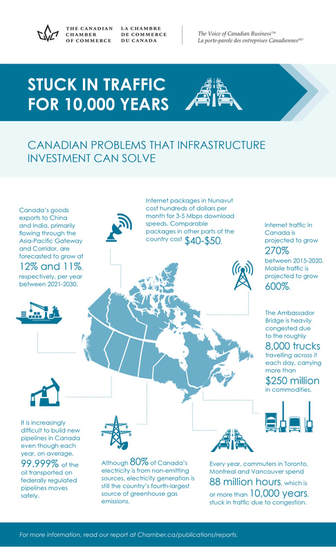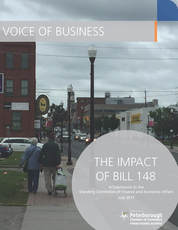 Oh Canada! Your varying geographic elements are a great source of pride and yet, they also create a great challenge when it comes to getting our products to market. A new report by the Canadian Chamber of Commerce, titled Stuck in Traffic for 10,000 Years: Canadian Problems that Infrastructure Investment Can Solve digs into the various ways we move products on roads, rail, pipeline, and online and offers a series of ideas to remove roadblocks to business competitiveness. The report highlights that lack of proper transportation infrastructure is a major barrier to Canada’s access to market and to its competitiveness, leading to lost opportunities and wasted time for both Canadian companies and residents. “Congested transportation systems – and the loss of time and productivity that comes with them - have become a reality for tens of thousands of businesses and their employees,” said Perrin Beatty, CEO and President of the Canadian Chamber of Commerce. Seven problem areas are identified in the report, including: Road Congestion in Large Cities Gridlock is an everyday reality that has economic and environmental costs including increasing greenhouse gas emissions, lowers employee productivity, increases time to move goods and provide services to customers and lowers quality of life. This gridlock doesn’t just happen in the usual places but reaches into our trading area with Oshawa drivers experiencing an additional 2.3 million hours of travel time a year compared to free-flow traffic. It will be interesting to see the impact of a completed 407 on GTA traffic patterns. Facilitating trade along the Asia-Pacific Gateway and corridor This gateway is an entry and exit point for 20% of Canadian goods moving to and from the Asia-Pacific corridor. The federal government needs to facilitate trade opportunities by ensuring strategic investments, improving supply chain data collection and increasing federal leadership around policy and regulatory barriers to keep the multi-modal corridor running on all cylinders and benefiting all Canadians. Improving digital access and infrastructure Canadians not only move products by road, rail and air, but also through digital infrastructure. The report highlights the need for increased public infrastructure investments in rural and remote connectivity, update tax incentives for private investments in telecommunications infrastructure, and ensure Canadian companies can benefit from opportunities presented by 5G. By 2020, internet usage forecasts predict a 240% increase in business internet traffic and a 500% increase in business mobile traffic. We've seen significant investment in the Peterborough area through EORN and the Bell Fibe investment. Maximizing potential in Canada’s North Identifying infrastructure needs, ensuring the greatest economic and social impacts and using the proposed infrastructure bank will help unlock new opportunities in the North. Enhancing the Ontario-Quebec trade corridor Just as the Asia-Pacific Corridor is important in the west, the Ontario-Quebec trade corridor is a lifeline for the central part of the country, including Peterborough. There is a call in the report to improve border infrastructure, complete construction on the Gordie Howe bridge and reinvigorate a coordinated approach to developing the Continental Trade Corridor. The proposed High-Frequency Rail (HFR) project by VIA Rail also has a role in improving this corridor, in that it can spread the need for passenger travel on two lines and during the evening hours freight could be accommodate along the proposed route from Toronto through Peterborough to Ottawa and Montreal. The Peterborough Chamber of Commerce is a strong supporter of the HFR plan. Getting Canadian oil and gas to markets This is a crucial piece of pie for Canada because delays in the regulatory process are limiting the private sectors ability to build pipeline infrastructure to move Canada’s oil and gas. The reality is that there is no existing eastward route for Canadian to service other Canadians. The current export pipelines run north-south and with “the US preparing to reduce taxes, regulatory burden and environmental standards on the American energy industry, it’s more important than ever for the federal government to create the conditions for energy projects in Canada to succeed." For Peterborough there is a crucial connection, as GE holds the contract to build the large motors for the Energy East pipeline. It’s a contract that would bring 250 jobs to the plant. Green electrification and transmission Three good ideas under this category heading include, supporting interprovincial grid connectivity where it makes sense, ensuring that any shift to more renewable electricity protects consumers, businesses and overall reliability and providing capital investments to help remote communities transition away from diesel power. “Inconsistent public investment in our transportation systems is a hindrance to small and large businesses alike with real environmental and economic costs. Canadians in the country’s largest cities are collectively losing over 10,000 years sitting in their cars every year, time that could be much better spent,” Mr. Beatty said. “As MPs tour Canada this summer making infrastructure announcements, we need to ask, ‘are these investments being spent in the right places?’” he concluded. Full Report Peterborough Chamber of Commerce makes Written submission to Committee Hearings on Bill 1487/24/2017
 PETERBOROUGH, July 24, 2017: The Peterborough Chamber of Commerce has sent in a written submission to the Standing Committee on Finance and Economic Affairs on Bill 148. Since the announcement of the Fair Workplaces, Better Jobs Act, many of our Chamber members have expressed concerns about the pace at which this legislation is being implemented and the impact on the economic growth of Peterborough and the province. “Under the proposed Bill 148, this group of constituents is facing a dramatic increase in staffing costs over the next 18 months,” says Stuart Harrison, President & CEO, Peterborough Chamber of Commerce. “These costs are not alone related to the proposed minimum wage increase and have caused businesses to consider the impact and how they will stay afloat.” We took the concerns of our local employers and have submitted them to the provincial government along with a list of recommendations that our Peterborough business community put forward. “The recommendations stem from conversations and a roundtable the Peterborough Chamber held with 24 businesses from all sectors of the Peterborough economy,” adds Harrison. “They focus on the need for more time to adapt, as well as, providing sector-specific relief, and considering other ways to achieve the desired outcome.” We thank our member businesses for providing their comments and adding their voice to this conversation. As the cover letter to the report states, “employers and employees have to band together to make the economy work.” Read the Report: The Impact of Bill 148 -30- Media Contact: Sandra Dueck Policy Analyst/Communications Specialist [email protected] or 705.748.9771 x215 A new report by the Ontario Chamber of Commerce (OCC) aims to help get small and medium-sized businesses on track toward developing a mental health strategy for their workplace. While it is identified in the report that 81% of businesses believe that it is important to support their employees’ mental wellness in the workplace, there are still some gaps in terms of acting on that belief. In a 2016 Fresh Intelligence survey it was found that 35% of small business, 65% of medium-sized business and 76% of large business had mental health strategies. The Mental Health Commission of Canada finds that the cost of mental health to the economy is $50 billion per year. The challenge with mental health is that it can be an intimidating topic for employers and employees. In response to the gap, the OCC has developed a toolkit based on three principles:
The City of Peterborough is considering three different options to balance out the wards to ensure effective representation. Population in wards should not be more or less than 25% different from the average.
In a recent report to council, staff recommend sticking with the five wards the city currently has:
As a result, staff have drafted three proposals using the following:
Fill out the survey  The hearings on Bill 148 Fair Workplaces, Better Jobs Act started this week. Monday saw the Standing Committee on Finance and Economic Affairs in Thunder Bay. Today, the committee will be in Kingston. Several Peterborough groups will be presenting, along with our Chamber counterparts at the Greater Kingston Chamber of Commerce. Earlier this week we supported a letter to the Premier from the Keep Ontario Working Coalition, which includes the Ontario Chamber of Commerce and 12 other business groups and associations. Our Peterborough Chamber message to the Committee echoes that of the letter and the concern of our members, 93% of whom are small business. It’s simply that the changes contained in the proposed legislation will be difficult to absorb and adjust to in such a short time frame. “Recently, a roundtable with 24 businesses from all sectors of the Peterborough economy expressed that the changes were too much, too fast,” says Stuart Harrison, President & CEO, Peterborough Chamber of Commerce. “Businesses need time to adapt and have told us that without time, they are forecasting fewer hours, fewer new jobs, increased prices and, in some cases, more automation.” As it stands now, Ontario’s minimum wage will increase by 32 per cent in only 18 months, with the bulk of that increase happening in the next six months. This particular element of Bill 148 means businesses will have to absorb between $30,000 and $100,000 per year depending on the number of employees. However, the adjustment to minimum wage, which was not a part of the two year Changing Workplaces Review, is not the only concern. Other pieces of the legislation, such as the 48 hour rule, also bring challenges in industry sectors important to the Peterborough region, such as agriculture and tourism. Broad sweeping rules do not recognize the unique aspects of these industries and the mostly small and medium-sized businesses that operate within them. Over the past number of weeks there has been great discussion about how the $15/hour wage is impacting other communities and particularly large cities, such as Seattle, in the United States. However, in comparison to the quick timeline proposed for Ontario, many of these jurisdictions have been on five year trajectories and even then there is great debate about whether or not the desired outcomes have truly been achieved. For example, the State of California is taking five years to increase their minimum wage by 50 per cent to $15/hour with employers of less than 25 employees. Seattle has allowed for a 4-year implementation for a 36 per cent wage increase. However, recent evidence by the National Bureau of Economic Research has suggested that the costs of the Seattle minimum wage increases outweigh the benefits by 3:1. In that instance, low-wage workers are losing $125 per month due to less hours of work scheduled. “To demonstrate true fairness and compassion for workers, we must ensure Ontario has a strong economy to help create jobs and increase economic growth,” said Karl Baldauf, Vice President of Policy and Government Relations at the Ontario Chamber of Commerce (OCC) and Spokesperson for the Keep Ontario Working Coalition. Throughout the past two years of the Changing Workplaces Review the Chamber Network called for a balanced approach to change. Achieving that balance includes slowing down the time frame for implementation, and understanding the economic impact of the proposed changes to businesses across sectors, and by size and location (rural/urban). The Keep Ontario Working Coalition has commissioned an independent economic analysis of the impact of these proposed changes on the economy. The results are expected in August. Sure, we can make some preliminary recommendations around mitigation strategies, but without taking the time to understand all the potential ripple effects of Bill 148 and its quick implementation those strategies may not be as effective as hoped. Being able to look at both sides of the equation is prudent to ensure Ontario’s continued competitiveness. Recent letter to Premier Wynne from the Keep Ontario Working Coalition Labour Relations and Employment Standards Changes Too Much, Too Fast The Keep Ontario Working coalition calls for Ontario Government to give employers more time to adjust to sweeping reforms PETERBOROUGH, July 10, 2017: The Keep Ontario Working group, a coalition of Ontario’s leading industry and sector associations, has sent an open letter to Ontario Premier Kathleen Wynne which urges the Government of Ontario to slow down the implementation of Bill 148.
The Fair Workplaces, Better Jobs Act will bring about major changes in less than six months, and Ontario’s employer community is concerned that the pace of change will seriously injure our economic growth. The Keep Ontario Working coalition is calling on the provincial government to give businesses more time to better prepare. As part of the Ontario Chamber Network the Peterborough Chamber of Commerce is supportive of the letter. “Recently, a roundtable with 24 businesses from all sectors of the Peterborough economy expressed the same message - that the changes were too much, too fast,” says Stuart Harrison, President & CEO, Peterborough Chamber of Commerce. “Businesses need to time to adapt and have told us that without time they are forecasting fewer hours, fewer new jobs, increased prices and, in some cases, more automation.” In their letter, the Keep Ontario Working group calls on the government to consider the timing of implementation. As it stands now, Ontario’s minimum wage will increase by 32 per cent in only 18 months. “To demonstrate true fairness and compassion for workers, we must ensure Ontario has a strong economy to help create jobs and increase economic growth,” said Karl Baldauf, Vice President of Policy and Government Relations at the Ontario Chamber of Commerce (OCC) and Spokesperson for the Keep Ontario Working Coalition. “To plan effectively and protect jobs, employers need predictability and time to adjust to these changes. There is no way to absorb and adjust to a 32 per cent hit in less than 18 months.” The Keep Ontario Working coalition has commissioned its own an independent economic analysis to better understand the economic impact of these changes. The results of the coalition’s economic analysis will be shared this coming August. Read the open letter to Premier Kathleen Wynne -30- The Keep Ontario Working Coalition (KOW) is a broad-spectrum group of business sector representatives concerned with sound public policy to help produce jobs and grow Ontario. For more information on the Keep Ontario Working coalition please visit www.keepontarioworking.ca. Media Contact: Sandra Dueck Policy Analyst/Communications Specialist [email protected] or 705.748.9771 x215 The Greater Peterborough Chamber of Commerce is seeking members* interested in serving on the Board of Directors.
This is an exciting opportunity for members who are vitally interested in our organization, who have foresight, and are good at conceptualizing. Serving on the Board of Directors with fellow business leaders in the community will utilize your group and teamwork skills. The Board of Directors plays a significant role in the development of Chamber policies and focuses on governance of the organization through policy governance. Directors must be willing to make the appropriate time commitment (please see application form). Representing the Chamber Membership, Directors carry forward the "Voice of Business" to all levels of government. For more information on the work of the Chamber, please visit www.peterboroughchamber.ca. If you are interested, please complete the Board Application Form. The form must be completed in its entirety and submitted to the Chamber by August 15, 2017 at either: Email: [email protected] Fax: 705-743-2331 Regular mail: Greater Peterborough Chamber of Commerce, 175 George Street North, Peterborough, ON K9J 3G6 *Only members in good standing may apply. The Greater Peterborough Chamber of Commerce is a member-based organization representing over 900 Peterborough and area businesses. Our main focus is to channel the collective strength of the business community to improve the economy. This includes providing representation on numerous committees, conducting surveys, issuing discussion papers and developing policy positions on issues of significance to our members.  Facing a 30 percent plus increase in the minimum wage over the next 18 months has many local businesses wondering how they are going to fulfill this potential legislative demand. We put 24 small business owners and managers in a room with the Minister Responsible for Small Business, and Peterborough MPP Jeff Leal for two and a half hours, and the overwhelming feedback was that the proposed changes were “too much; too fast”. From restaurants to retailers, manufacturers to Not for Profits, all were talking about fewer hours for employees, fewer new hires, job cuts, automation and increased prices. Anyone who wishes to criticize the small business owner for this reaction needs to spend some time with them, finding out just what it takes to meet payroll these days. Meanwhile, earlier this year the provincial government announced three pilot projects (Lindsay, Hamilton, and Thunder Bay) designed to test the concept of a Basic Income Guarantee. Under the program single recipients would receive up to $16,989 from the government, less 50% of any income earned. Calculations show that the income one would have to earn before they were no longer eligible for a portion of the basic income amount would be $33,978. If minimum wage increases go through and the employee works a 40 hour week, their yearly earnings before taxes would be $31,200. Over the next three years, the Basic Income Pilots will also measure outcomes around:
Outcomes from this study have the potential to provide very good information on which to base a decision on how to best serve vulnerable workers and those on low incomes. And yet, the Government is not willing to wait. Instead they are pushing through $15 Minimum Wage legislation on such a short timeline that even employees are worried, recognizing that in order to make $15/hour they need to have a job… There’s no doubt all eyes are on Seattle right now as that city moves forward toward a $15 minimum wage. Many aspects of the Seattle policy have been studied, but a recent study from the University of Washington showing the latest increase to $13 resulted in a decrease of income paid to low-wage employees of $120 million or a loss $125/month for each worker. This suggests that the concerns of the typical small business owner and their employees are valid. Ontario’s minimum wage is currently tied to the Consumer Price Index and has been increasing yearly since 2014. The Ontario government had the forethought to establish Basic Income Guarantee Pilots to assess the impact of such a program on low income workers. The impact of free tuition for students from low income households has not been fully assessed. These are good policies and pilots that could reach into the core of the issue of income security and make a difference. Business can be a willing partner, but forcing a 30 percent plus increase through wages onto small and medium sized businesses at a time of high hydro rates, increasing WSIB and CPP premiums, and more inspectors to police it all, challenges the perception that Ontario is open for business. Read more on the issue: Enough talk about the fat cat business owner The unintended consequences of a $15 minimum wage keepontarioworking.ca  July 1st of any given year is not only Canada’s birthday, but a milestone of sorts for regulations. Being the midpoint of the year, it’s also the day some new regulations come into effect. 2017 is no different. Broadly speaking, 16 ministries brought in new regulations on July 1st. These include measures such as updating the knowledge and road tests for commercial licences, new rules around registration and inspection of mobile cranes, simplifying the rule for small game hunting in central and northern Ontario, adding close to 10,000 hectares of land to the Greenbelt Area, establishing separate requirements for constructing retirement homes and making it easier for Ontarians to build secondary suites. There is also a regulation to create a new VQA wine category for wines made from white or pink-skinned grapes, closure of the Used Tires Program and the Ontario Tire Stewardship as the province transitions to the new waste-free Ontario framework, refinancing the Global Adjustment to provide rate relief, and enabling pairing of renewable energy systems with energy storage systems. The notice of regulations also includes a recap of business burden reduction measures to date and proposed measures for the future including offsetting every $1 of new administrative costs to business by removing $1.25 of old and unnecessary costs. Read the full list |
AuthorThe Peterborough and the Kawarthas Chamber of Commerce acts as a catalyst to enhance business growth, opportunity, innovation, partnerships and a diverse business community. Archives
June 2024
Categories |
|
Copyright Greater Peterborough Chamber of Commerce. All rights reserved.
175 George Street North, Peterborough, ON, K9J 3G6 Phone: (705) 748-9771 | (705) 743-2331 Home | Calendar | Site Map | Privacy | Accessibility |
